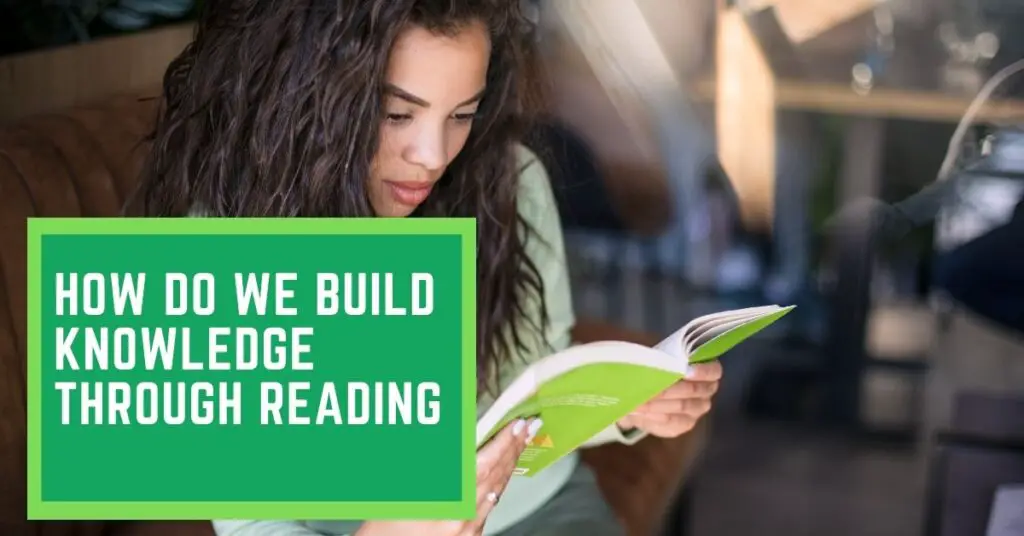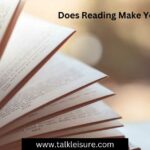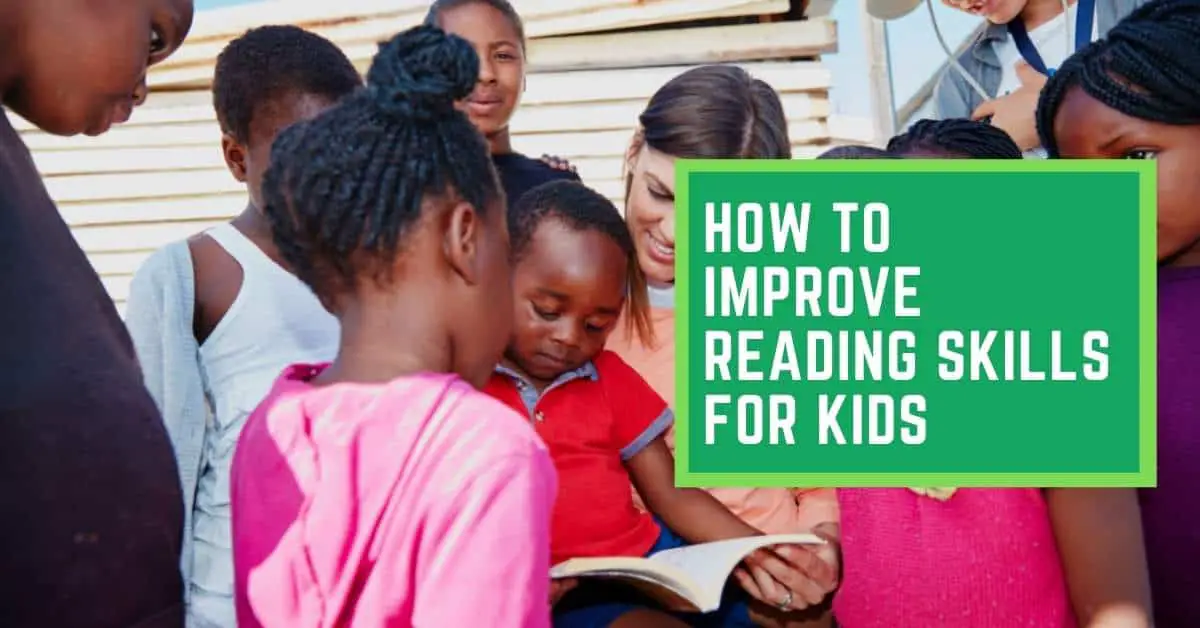When we read, we are building our knowledge. We learn new things and gain a deeper understanding of the world around us. But how does reading help us to build our knowledge? There are a few ways in which reading helps us build our knowledge.
Firstly, when we read, we are exposed to new information. This can be information about other cultures, history, science, or anything else that we may be interested in. By reading about new topics, we can learn a great deal about the world around us.
Secondly, reading helps us to develop our critical thinking skills. When we read, we have to engage with the text and think about what it means. This helps us to develop our ability to analyze and interpret information.
Finally, reading can also help us to develop our writing skills. We can learn how to express our ideas clearly and concisely by reading extensively.
So, reading is a great way to build our knowledge. It exposes us to new information, helps us think critically, and develops our writing skills. So when you pick up a book, you are not just entertaining yourself – you are also building your knowledge.
Practices for Build Knowledge
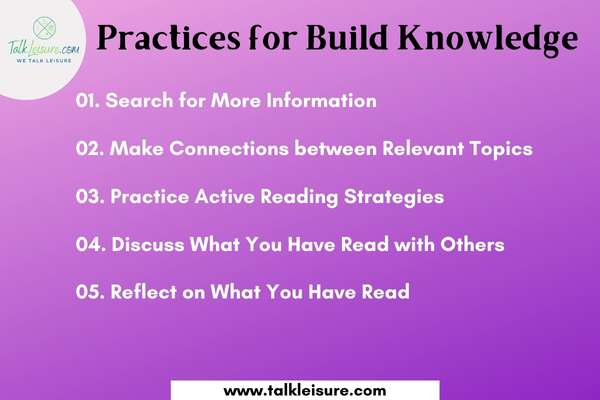
01. Search for More Information
It absolutely can! The more you know about any given topic, the easier it becomes to learn even more about it. Not only that, but your general understanding of the world around you will also grow as you continue to search for and absorb information.
The more you read and learn about a particular topic, the more knowledgeable you become on that topic. This increased knowledge can help you to understand better and make informed decisions on issues related to the topic.
Additionally, your increased knowledge may also allow you to offer insights and perspectives on topics that are not commonly known or understood. So keep learning and expanding your knowledge base – it can only benefit you in the long run!
02. Make Connections between Relevant Topics
Absolutely! When you make connections between seemingly unrelated topics, it helps broaden your understanding of both and lead to new insights.
For example, when I was reading about the history of the Roman Empire, I also read about the origins of Christianity. By making these connections, I was able to develop a better understanding of how the Roman Empire’s fall contributed to the rise of Christianity.
Similarly, when you read about different subjects, you can find connections between them that might not have been readily apparent before. For instance, by reading about physics and biology, you might learn about cellular structures that resemble atoms or molecules.
This type of thinking can help you see the world in a whole new way and open up new possibilities for learning and discovery.
03. Practice Active Reading Strategies
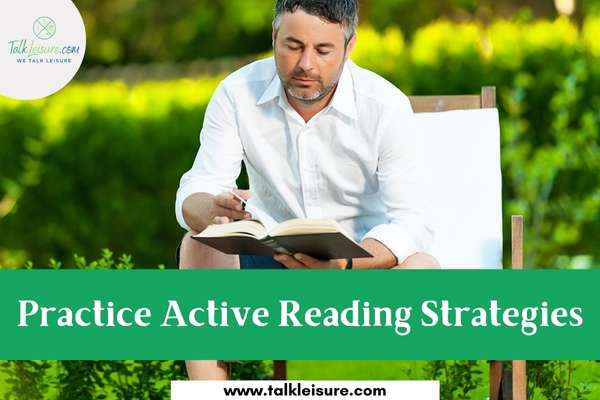
When you are actively engaged in reading, you are more likely to comprehend and remember the information that you read. Additionally, by using active reading strategies, you can better understand the author’s intent and the text’s main points.
Some active reading strategies that you can use include:
– Preview the text before you start reading. This will give you a better idea of what to expect from the text and help you focus on the main points.
– Take note of the key concepts as you read. This will help you keep track of the information that is most important.
– Summarize what you have read after finishing. This will help solidify the information in your mind and allow you to recall it more easily later on.
04. Discuss What You Have Read with Others
One of the best ways to ensure that you have understood what you have read is to discuss it with others. When you talk about a text with others, they can offer their own insights and perspectives that can help to improve your understanding.
Additionally, by discussing what you have read, you can also test your own knowledge and recall of the information. When discussing a text with others, it is important to be respectful of their opinions.
Remember that there is no one correct interpretation of a text – different people can understand it in different ways. So, be open to hearing what others have to say and try to see the text from their perspective. You might learn something new!
05. Reflect on What You Have Read
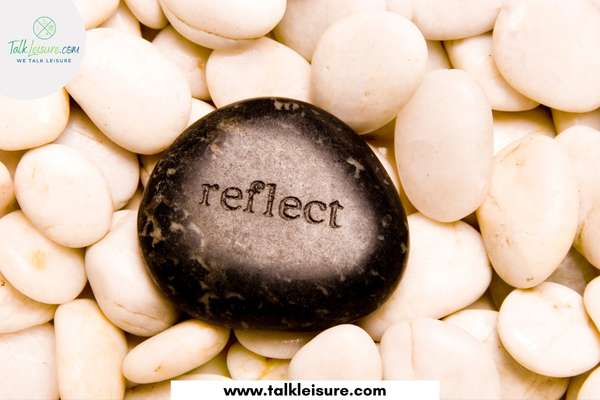
Reflecting on what you have read can also help improve your understanding of the text. When you reflect, you are essentially thinking critically about the information you have read. This means that you are not just passively accepting what you have read but are instead actively questioning and analyzing it.
Some questions that you can ask yourself when reflecting on a text include:
– What are the author’s main points?
– Do you agree or disagree with the author? Why?
– What new insights or perspectives did you gain from reading the text?
– How does the information in the text relate to your own life experiences?
By asking yourself these questions, you can deepen your understanding of the text and come away with new insights. So, take some time to reflect on what you have read – it will be worth your while!
Skills Develop by Reading
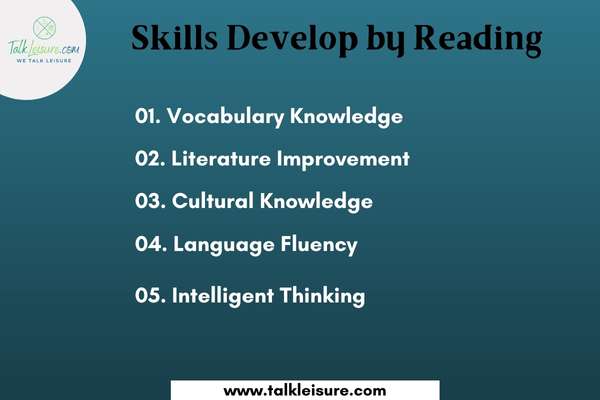
01. Vocabulary Knowledge
There are a few different ways that reading can help develop vocabulary knowledge. One way is through repeated exposure to words; as you encounter a word repeatedly in different contexts, you will start to learn its meaning and how to use it correctly.
Another way is through contextual guessing; by making educated guesses based on the context of a sentence, you can often figure out the meaning of words you don’t know just by using your prior knowledge and logic.
Finally, looking up words in a dictionary or online can also help to solidify your understanding of them. So overall, reading is a great way not only to learn new words but also to better understand the ones you already know.
02. Literature Improvement
Reading improves Literature by providing a deeper understanding of the text. When you read a text, your mind is actively engaged in deciphering the author’s meaning.
This comprehension process involves making connections between the words on the page and your own experiences, knowledge, and feelings. As you read, you constantly form interpretations of what you are reading.
The more you read, the more practice you get in analyzing and interpreting texts. The more experienced you become in this process, the better able you are to understand what an author is trying to say.
In addition, the more books you read, the greater your vocabulary becomes and the more knowledgeable you become about different subjects. All of these skills contribute to your ability to understand Literature.
03. Cultural Knowledge
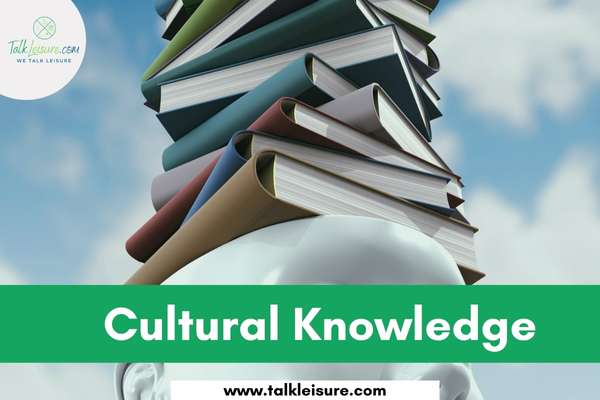
There are many ways in which reading can improve cultural knowledge. We can learn about other cultures and their customs, history, and values by reading.
In addition, by reading, we can become more aware of our own culture and how it compares to others. Furthermore, through reading, we can better understand the world around us and how different cultures interact with each other.
Ultimately, reading is essential for gaining Cultural Knowledge because it broadens our perspectives and helps us see things from different angles.
04. Language Fluency
You are exposed to a wide range of vocabulary, sentence structures, and grammar rules when you read. This increases your exposure to language and helps you learn new words and phrases.
Reading also allows you to hear the flow of language. This helps improve your fluency because you learn how to string words together to create smooth sentences.
Finally, reading can help improve your grammar skills. By reading extensively, you will gradually become more familiar with the different grammar rules that are used in English writing. This will help make your writing smoother and more error-free.
05. Intelligent Thinking

There is a lot of research that shows how reading practice improves intelligence. Reading not only helps to improve vocabulary and general knowledge, but it also helps to improve problem-solving skills and critical thinking.
One reason why reading is so beneficial for improving intelligence is that it helps to develop fluency and comprehension skills. When you read regularly, you learn to read more quickly and accurately.
This improved reading fluency allows you to focus on the meaning of the text instead of decoding each word. The improved comprehension skills that come from reading regularly allow you to understand complex texts more easily and make connections between different ideas.
Reading also helps to sharpen your thinking skills by providing opportunities for reflection and analysis. When you read a book, you constantly make inferences and draw conclusions. This process of active reading helps to improve your analytical and problem-solving skills.
Ultimately, reading is an excellent way to keep your mind sharp and increase your intelligence. By reading regularly, you can improve your fluency, comprehension, and thinking skills. All of these benefits will help you in both your personal and professional life.
Visual Explanations
i. Develop reading skills:
ii. Activate background knowledge:
Related Matters
01. Why is reading for knowledge important?
Whether you’re reading for work, school, or pleasure, acquiring new knowledge is always good.
It helps you better understand the world around you and can make you a more well-rounded and informed person. Plus, gaining knowledge generally, makes life more interesting – who doesn’t want to learn new things and expand their horizons?
There are all sorts of different ways to read for knowledge. You can read books, of course, but also articles, blog posts, and even tweets.
The key is to be patient, thoughtful, and critically minded as you read; you can parse out the valuable information from everything else. Reading actively instead of passively will help ensure that you’re learning something rather than just letting the words wash over you.
02. What is knowledge in reading?
There’s no one answer to this question since everyone has their definition of knowledge. For some people, knowledge in reading might mean being able to glean important information or lessons from texts.
For others, it might simply refer to being able to understand and follow the story. Ultimately, what counts as “knowledge” will differ from person to person.
That said, there are some general things that can be said about knowledge in reading. Firstly, it’s important to be able to engage with the text on a deep level – that is, thinking critically about what you’re reading and considering different interpretations.
Secondly, it’s helpful to have a strong vocabulary so that you can easily understand the author’s intentions and the devices used in the text. Finally, background knowledge is also key; if you’re familiar with the historical context or the author’s other works, that can certainly enrich your reading experience.
03. How does reading make you smarter?
There are lots of different ways that reading can make you smarter. For one, it helps you learn new information and facts. But reading also helps improve your vocabulary, your grammar, and your understanding of complex concepts.
Reading regularly can also help keep your mind sharp and prevent dementia or Alzheimer’s disease in later life. And finally, reading is a great way to relax and de-stress, which is good for both your mental and physical health. So overall, it’s pretty clear that reading makes you smarter!
04. How does reading help your memory?
When you read something, you are essentially committing that information to your memory. The more you read, the better your memory will become. This is because reading requires your brain to process and understand the words on the page, which strengthens your neural pathways and builds up your cognitive reserve.
Furthermore, reading also helps improve your concentration and focus, which are essential for optimal memory functioning. So if you want to boost your memory power, make sure to incorporate plenty of reading into your daily routine!
05. How does reading change your brain?
Reading definitely changes your brain! When you read, you engage in what is known as cognitive stimulation, which is basically when you challenge your brain to think in new and different ways.
This has all sorts of benefits, like making you smarter, improving your memory, and even staving off dementia. Plus, it’s just really fun!
So how does reading change your brain? Researchers believe that it helps build what are known as ‘neural pathways.’ These are basically like little highways that connect different areas of your brain together. The more you read, the more pathways you create, and the better your brain processes information.
Plus, reading also helps to improve your focus and concentration, both of which are essential for optimal brain function. So if you’re looking to give your noggin a workout, reading is definitely the way to go!


